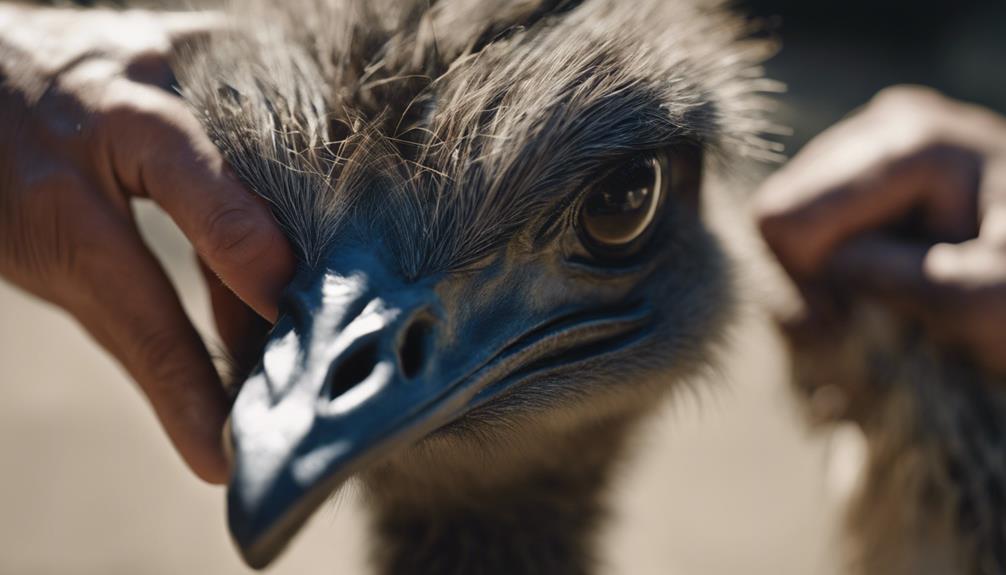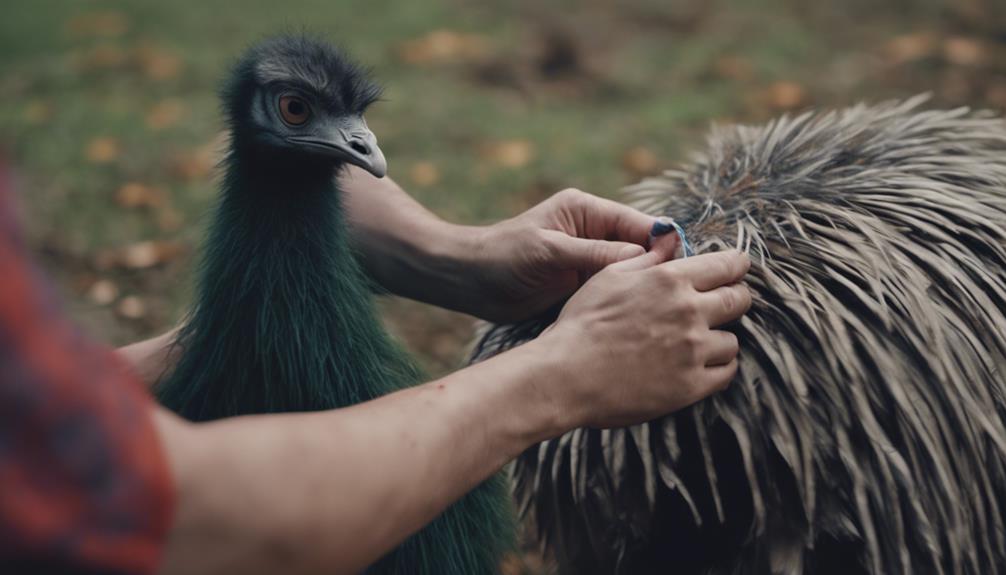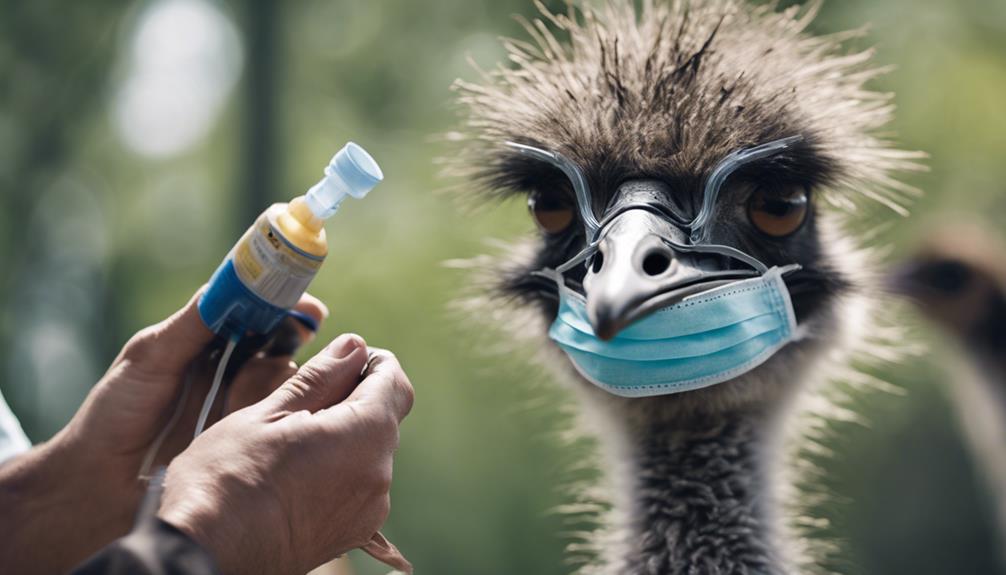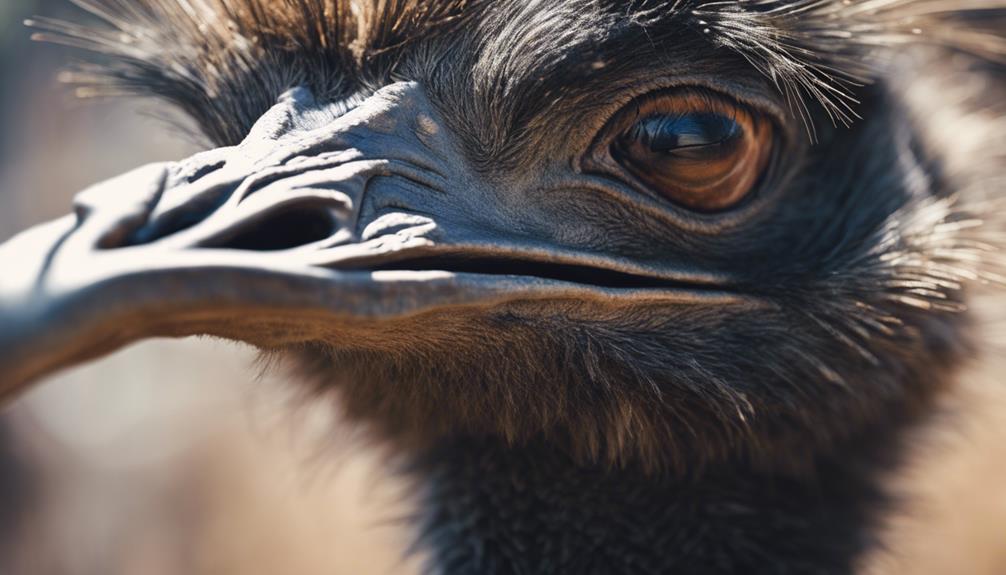
When faced with an emu health emergency, swift action is key to ensuring the best outcome for these majestic birds. From injuries to digestive issues and respiratory concerns, being prepared to handle various health crises is paramount. Proper assessment, quick intervention, and knowing when to seek professional help are crucial steps in safeguarding an emu's well-being. Stay tuned to discover essential tips for recognizing symptoms and responding effectively to emergencies that may arise, ensuring you are equipped to provide timely and appropriate care for these unique creatures.
Key Takeaways
- Assess injury severity promptly.
- Clean wounds with mild antiseptic.
- Apply sterile dressings carefully.
- Immobilize fractures with padded splints.
- Seek veterinary assistance for severe injuries.
Emu Health Overview

When assessing Emu health, it's crucial to consider their unique physiological adaptations and susceptibility to certain health issues. Emus are large flightless birds known for their speed and agility. Their bodies are designed for endurance, with powerful legs that allow them to run at high speeds for long distances. However, these same adaptations can also make them prone to certain health problems.
Emus have a complex digestive system that requires a specialized diet high in fiber. Any sudden changes in their food can lead to gastrointestinal issues. It's essential to monitor their diet carefully to prevent digestive disturbances.
Additionally, Emus are susceptible to heat stress, especially in hot climates. They must have access to shade and clean water at all times to prevent heat-related illnesses.
Understanding these unique physiological traits and vulnerabilities is crucial for maintaining the health and well-being of Emus under your care. Stay vigilant and proactive in addressing any health concerns promptly to ensure the longevity and vitality of these magnificent birds.
Identifying Common Symptoms
To effectively identify common symptoms in Emus, keen observation of their behavior and physical cues is essential. When assessing an Emu's health, pay close attention to any abnormal behaviors such as lethargy, loss of appetite, or excessive vocalization. These signs could indicate underlying health issues that require immediate attention.
Additionally, observe the bird's physical appearance for any abnormalities like limping, discolored feathers, or unusual swellings. Changes in their posture or movement patterns can also be indicative of discomfort or injury.
Furthermore, monitor their respiratory patterns for any signs of difficulty breathing, coughing, or nasal discharge. These symptoms may point towards respiratory infections or other respiratory issues. Keep a watchful eye on the Emu's droppings as well, as changes in consistency, color, or frequency can provide valuable insights into their digestive health.
First Aid for Injuries

For addressing injuries in Emus, swift and appropriate first aid measures are crucial to ensure their well-being and recovery. When dealing with wounds, the first step is to assess the extent of the injury. Emus are resilient creatures, but even minor injuries can lead to complications if not properly treated.
Begin by gently cleaning the wound with a mild antiseptic solution to prevent infection. Apply a sterile dressing to protect the wound from further damage and to promote healing. In cases of deep puncture wounds or severe injuries, it's essential to seek veterinary assistance promptly.
Fractures in Emus require immediate attention. If you suspect a fracture, carefully immobilize the affected limb using padded splints. Avoid putting pressure on the injured area and keep the Emu calm to prevent further harm. Transport the Emu to a veterinarian as soon as possible for a thorough evaluation and treatment.
Dealing With Digestive Issues
Addressing digestive issues in Emus requires a thorough understanding of their dietary needs and digestive system functions to ensure optimal health and well-being. Emus are unique creatures with specific requirements, and any digestive problems can have serious consequences if not promptly addressed.
To effectively deal with digestive issues in Emus, follow these crucial steps:
- Assess Diet: Evaluate the emu's current diet to ensure it meets their nutritional requirements and is free from any potential irritants or toxins.
- Monitor Water Intake: Adequate hydration is essential for proper digestion. Keep a close eye on the emu's water consumption to prevent dehydration.
- Observe Droppings: Regularly inspect the emu's droppings for any changes in consistency, color, or frequency, as these can indicate digestive issues.
- Consult a Veterinarian: If you notice persistent digestive problems or unusual symptoms, seek professional help from a veterinarian experienced in treating emus.
Respiratory Emergency Response

In responding to respiratory emergencies in Emus, swift action and accurate assessment are critical for ensuring their well-being and swift recovery.
When faced with a respiratory distress situation, first, carefully observe the emu's breathing pattern. Rapid, shallow breaths, wheezing, or gasping for air are signs of potential respiratory issues.
Immediately isolate the affected emu to prevent the spread of any contagious respiratory conditions to the flock. Ensure proper ventilation in the area to aid in the bird's breathing.
Contact a veterinarian with avian experience promptly for further guidance and potential treatment options. While waiting for professional help, keep the emu calm and minimize stress to reduce the strain on its respiratory system.
Avoid administering any medications without professional advice, as some substances can be harmful to emus. Remember, quick and accurate action is key in handling respiratory emergencies to safeguard the health and well-being of your emus.
Understanding Parasitic Threats
To effectively manage the health of your emus, recognizing and addressing parasitic threats is crucial for their overall well-being and longevity. Parasites can wreak havoc on your emus' health, so staying vigilant is key. Here are some essential points to consider:
- Regular Fecal Testing: Conduct routine fecal tests to check for internal parasites such as worms. This proactive measure allows for early detection and treatment.
- Proper Hygiene Practices: Maintain clean living environments to minimize the risk of parasitic infestations. Regularly clean and disinfect living areas and water sources.
- Consult with a Veterinarian: Establish a relationship with a veterinarian experienced in treating emus. They can provide guidance on parasite prevention and treatment.
- Implement Preventative Measures: Administer parasite prevention medications as recommended by your veterinarian. These measures can help safeguard your emus against parasitic threats and promote their overall health.
Skin and Feather Problems

For maintaining the optimal health and condition of your emus, vigilance towards skin and feather problems is essential. The skin and feathers of your emus serve as vital indicators of their overall health. Keep a keen eye out for any signs of feather loss, skin lesions, or abnormal molting patterns. Feather loss can be a result of various issues such as poor nutrition, external parasites, or stress. Skin lesions may indicate bacterial or fungal infections that require immediate attention to prevent further spread. Abnormal molting patterns could be a sign of underlying health issues that need to be addressed promptly.
Regularly inspecting your emus for any abnormalities in their skin and feathers is crucial for early detection and treatment of potential health issues. Providing a well-balanced diet, ensuring proper hygiene in their living environment, and minimizing stressors can help prevent many skin and feather problems. Consulting with a veterinarian experienced in emu health is recommended for accurate diagnosis and treatment plans tailored to your emus' specific needs. Your proactive approach to monitoring and addressing skin and feather problems will contribute to the overall well-being and vitality of your emus.
Managing Heat Stress
Combatting heat stress in emus requires strategic planning and proactive measures to maintain their health and well-being. Emus are particularly susceptible to heat stress due to their large size and inability to sweat, making it crucial to manage their environment effectively.
Here are some powerful strategies to help you manage heat stress in your emus:
- Ensure Proper Ventilation: Install fans or misters in the emu enclosure to promote air circulation and create a cooling effect.
- Provide Ample Shade: Set up shelters or natural structures that offer shade throughout the day to allow emus to escape from direct sunlight.
- Offer Access to Fresh Water: Keep multiple water sources available and ensure they're regularly refilled to keep emus hydrated and cool.
- Monitor Behavior Closely: Watch for signs of heat stress such as panting, wing drooping, or decreased activity, and take immediate action if any issues arise.
Preventing Infections

Keeping your emus healthy and thriving involves not only managing heat stress but also implementing effective measures to prevent infections. Infection prevention is crucial for maintaining the well-being of your emus and ensuring they remain strong and resilient.
To prevent infections, start by maintaining clean living conditions in their environment. Regularly clean and disinfect their living quarters, feeders, and waterers to reduce the risk of contamination. Additionally, monitor your emus for any signs of illness or abnormal behavior, as early detection can prevent the spread of infections.
Another key step in infection prevention is ensuring that your emus receive a balanced diet that meets their nutritional needs. Proper nutrition boosts their immune system, making them less susceptible to infections. Provide access to fresh, clean water at all times and feed them high-quality emu feed to support their overall health.
Lastly, consider implementing a vaccination program recommended by a veterinarian to protect your emus from common infectious diseases. By following these preventive measures, you can significantly reduce the risk of infections and keep your emus healthy and thriving.
Emergency Egg Concerns
To address emergency egg concerns effectively, swift action and careful observation of your emus' nesting habits are essential. When facing issues related to your emus' eggs, it's crucial to act promptly to ensure the health and safety of both the birds and their offspring. Here are some key points to consider:
- Egg binding: Monitor your emus for signs of distress or prolonged straining, which may indicate egg binding. This condition requires immediate intervention to prevent further complications.
- Egg breakage: Check the nesting area regularly for any broken or damaged eggs. Remove these eggs promptly to prevent the spread of bacteria and potential harm to other eggs or emus.
- Egg fertility: Keep track of the fertility of the eggs by observing mating behaviors and consulting with a vet if necessary. Infertile eggs can be a sign of underlying health issues.
- Egg incubation: Ensure that eggs are being properly incubated, maintaining the appropriate temperature and humidity levels. Deviations from these conditions can impact the viability of the eggs.
Behavioral Health Considerations

Monitor your emus' behavioral cues closely to assess their mental well-being and address any potential stressors effectively. Emus are highly sensitive creatures, and changes in their behavior can be indicators of underlying issues. Look out for signs of distress such as excessive pacing, aggression towards other emus, or a lack of appetite. These behaviors could signify various stressors, including changes in their environment, health issues, or lack of social interaction.
To ensure your emus' well-being, establish a routine that includes regular feeding times, social interactions, and ample space for exercise. Emus thrive in environments that mimic their natural habitat, so providing them with opportunities to forage and explore can help reduce stress levels. Additionally, consider the social dynamics within your emu group, as conflicts among emus can lead to heightened stress and aggression.
Preparedness for Emergencies
Are you equipped with the necessary tools and knowledge to handle potential health emergencies involving your emus effectively? In the world of emu care, being prepared can make all the difference when emergencies strike. Here are some key steps to ensure you're ready for any health crisis that may arise:
- Emergency Kit: Always have a well-stocked emergency kit on hand with essential items such as bandages, disinfectants, thermometers, and medications.
- Emergency Contact List: Maintain a list of emergency contacts including veterinarians, animal hospitals, and local wildlife authorities for quick assistance.
- Training: Stay informed by attending workshops, seminars, or online courses focused on emergency care for emus.
- Regular Drills: Conduct regular drills to practice your emergency response plan and ensure smooth execution during real emergencies.
Frequently Asked Questions
How Can I Safely Transport an Injured Emu to the Vet?
To safely transport an injured emu to the vet, carefully approach the bird to avoid causing distress, gently lift it using a towel or blanket, and place it in a secure, well-ventilated carrier. Drive calmly to the vet, ensuring a smooth journey.
Are There Any Specific Plants or Foods Toxic to Emus?
When caring for emus, avoid feeding them toxic plants like azaleas, rhododendrons, and oleanders. These can harm your emus. Stick to safe options like grass, grains, and specially formulated feeds to keep them healthy.
Can Emus Be Trained to Tolerate Medical Treatments?
You can train emus to tolerate medical treatments through positive reinforcement techniques. Consistent training sessions, rewards, and patience are key. Emus, like many animals, can learn to accept necessary care with the right approach and handling.
What Are the Risks of Over-Medicating an Emu?
Over-medicating an emu can lead to serious health issues like organ damage, toxicity, and even death. It is crucial to follow proper dosage guidelines and consult with a veterinarian to avoid these risks.
How Can I Provide Emotional Support to a Sick Emu?
Empathize and engage with your ailing emu through tender touches, soothing sounds, and tranquil tones. Time, tenderness, and talking can greatly comfort your feathered friend, fostering feelings of safety and security during sickness.
Conclusion
Now that you're equipped with the knowledge and skills to handle emu health emergencies, remember to stay calm and act swiftly when needed.
By closely monitoring symptoms, providing proper first aid, and seeking timely veterinary assistance, you can ensure the well-being of these unique birds.
Remember, preparation is key, so stay informed and ready to respond effectively in any situation that may arise.
Your dedication to their health is truly commendable.




